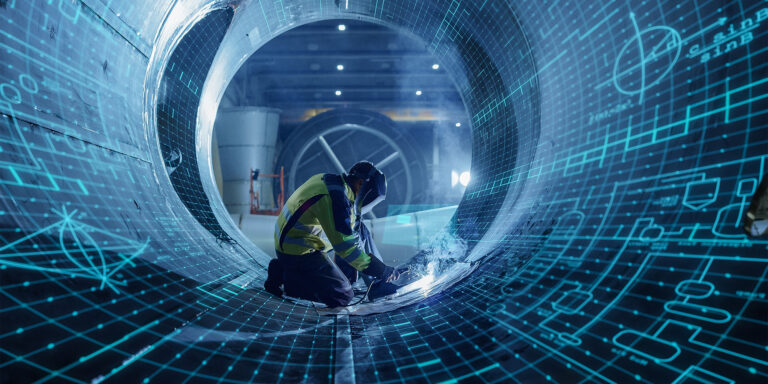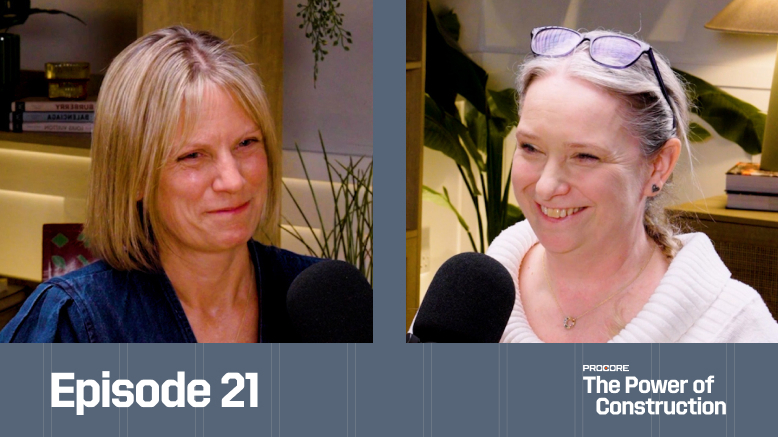— 5 min read
Building in Balance: Technology and Well-being in Construction



Last Updated Sep 23, 2025

Lisa OBrien
Director of Industry Culture
Lisa OBrien is the Director of Industry Culture at Procore Technologies. Lisa leads a team of culture strategists and coaches who support the company's vision to improve the lives of everyone in construction. With over 20 years of experience in executive coaching, organizational development, change management and leadership training, Lisa helps Procore's clients and partners create and sustain high-performing and healthy cultures that foster innovation, increase collaboration, and drive business. Lisa has worked with leading organizations such as McKinsey & Company, Diversitas and the Institute of Coaching at Harvard Medical School, to design and deliver impactful executive coaching and learning programs that enhance individual and collective growth, resilience and well-being.

Rebecca Factor
Rebecca has a broad range of experience in people consulting, both from large and boutique firms, where she supported clients on culture and inclusion, change management, talent management, and leadership development. With a Master's degree in organizational psychology and certified as a ProSci change practitioner, Rebecca brings a deep understanding of human behavior, business research, and data-driven insights to better service the industry.
Last Updated Sep 23, 2025

The construction industry is in the midst of a culture shift driven by the technology that has revolutionized how the industry works. Digital tools and advanced software have redefined how work gets done, how teams communicate, collaborate and solve problems. Today’s construction professionals work seamlessly across devices, issuing change orders or accessing project data in real-time from the jobsite and beyond.
This shift has brought efficiency and flexibility, reshaping expectations for speed and precision. But tech also presents new challenges, particularly as technology blurs the boundaries between work and personal life, requiring teams to adapt to an always-connected environment.
CEO of Peninsulators Courtney Daniels shares her insights on how technology is influencing construction culture, addressing both its promises and challenges.
Table of contents
Embracing a New Era in Construction
The integration of technology plays a huge role in the evolution of construction. New technology provides tools for better communication and problem-solving, and by embracing these changes, the construction industry can move beyond traditional boundaries.
As the industry continues to change, the focus must remain on building together. This involves not only adopting technological innovations but also cultivating an environment where diverse perspectives are valued. By doing so, the construction industry can usher in a new era of growth and success characterized by collaboration and respect.
The Double-Edged Sword of Connectivity
Technology has undeniably improved efficiency, communication and project management in the construction industry. The ability to communicate and manage projects from virtually anywhere has leveled the playing field, enabling smaller firms to compete more effectively with larger counterparts. This democratization of access and capability has been a game-changer for many businesses striving to expand their reach and impact.
The abundance of information now available has enabled teams to achieve much more with fewer resources. Yet, the expectations and timelines for project completion have only intensified. This is something my team is actively examining. I recognize that I need to set an example by maintaining healthier work hours. It's important for me to lead from the front and establish clear boundaries, emphasizing that we must respect our limits.

Courtney Daniels
CEO
Peninsulators
While technology offers numerous advantages, it also blurs the lines between work and personal life. Construction professionals often feel the pressure to be constantly available, which can contribute to a culture of overwork and potentially lead to burnout.
The industry's challenge is to harness the benefits of technology while creating a work environment that respects personal time and promotes well-being. Establishing clear boundaries and setting realistic expectations are essential steps toward achieving this balance.
There has always been pressure in the construction industry, but previously, when the workday ended at 4 or 5 p.m., it was truly over. You couldn't access drawings or documents because they were left in the office. That clear boundary no longer exists. It's been challenging for us to redefine what normal working hours should look like and to establish boundaries, such as saying, 'We work during these hours, and unless it's an emergency, please don't contact us outside of this time.' In our case, dealing with window coverings, emergencies are rare. Without these boundaries, we risk creating a 24-hour work cycle, which could lead to widespread burnout."
"I want people to feel empowered to take time for themselves, whether that means leaving work early, going to the gym, getting outside to enjoy some sunlight or simply taking a break to meditate or have lunch. We're not very good at prioritizing these things here, but my hope is that by encouraging such practices, we can draw from collective knowledge to improve our well-being and make our lives easier.
Courtney Daniels
CEO
Peninsulators
Technology and Shifting Leadership Styles
Access to real-time data and analytics through technology enhances communication and decision-making processes. Looking to the future, the rapid pace of technological change, combined with the entry of a new generation into the workforce, offers opportunities to establish new standards and integrate technology more seamlessly.
This integration allows technology systems to communicate directly with each other, reducing the reliance on individuals to bridge data gaps. Consequently, this allows for a more thoughtful examination of workplace policies, particularly those related to work hours and employee well-being.
When considering the future, it's important to focus on the new generation entering the workforce and the rapid technological advancements occurring globally. We have reached a point where we can establish new standards and integrate technology more effectively. This integration should be designed so that technology systems communicate directly with each other, reducing the need for individuals to manually connect different data sources. As a result, we can thoughtfully evaluate workplace policies, particularly those concerning employee work hours and overall well-being.
Courtney Daniels
CEO
Peninsulators
Leveraging these technological advancements will help the construction industry create a more dynamic and adaptive leadership style better suited to meet the challenges and opportunities of the modern work environment.
Free AI in Construction Course with Hugh Seaton
Start learning today with industry expert Hugh Seaton and discover how AI can boost efficiency, reduce risk, and transform your projects.

Technology and Cultural Transformation
Construction has never been more accessible. Modern construction technologies have streamlined — and in some cases even automated — communication and administrative processes. Physical binders stacked 6 feet tall and filled with paperwork are now accessible from a tablet on the jobsite — organized based on phase, date or manager.
Stakeholders can now remotely view projects using Virtual Reality (VR), Virtual Design and Construction (VDC) and Building Information Modeling (BIM) and give their approval from across the globe, while robot dogs can quality check projects using AI comparisons of a video feed to a model.
Technology has enabled professionals to work effectively without the need to be physically present in the office or the jobsite. But, as construction companies increasingly adopt these technological advancements, it is important for them to intentionally cultivate a strong workplace culture.
Accessibility to projects from anywhere means that it can blur the lines of when workers are on the job — which can create burnout if proper boundaries are not set. Keeping workers at their best requires a company culture that creates and respects boundaries, communicating when they are on the job and when they are not. After all, everyone involved in a construction project has a life outside that project.
If you're interested in learning more about how Procore can help with leadership development and culture transformation, please email industrycultureteam@procore.com or visit procore.com/industry-culture.
Was this article helpful?
Thank you for your submission.
100%
0%
You voted that this article was . Was this a mistake? If so, change your vote
Scroll less, learn more about construction.
Subscribe to The Blueprint, Procore’s construction newsletter, to get content from industry experts delivered straight to your inbox.
By clicking this button, you agree to our Privacy Notice and Terms of Service.
Thank you!
You’re signed up to receive The Blueprint newsletter from Procore. You can unsubscribe at any time.
Categories:
Written by


Lisa OBrien
Director of Industry Culture | Procore Technologies
Lisa OBrien is the Director of Industry Culture at Procore Technologies. Lisa leads a team of culture strategists and coaches who support the company's vision to improve the lives of everyone in construction. With over 20 years of experience in executive coaching, organizational development, change management and leadership training, Lisa helps Procore's clients and partners create and sustain high-performing and healthy cultures that foster innovation, increase collaboration, and drive business. Lisa has worked with leading organizations such as McKinsey & Company, Diversitas and the Institute of Coaching at Harvard Medical School, to design and deliver impactful executive coaching and learning programs that enhance individual and collective growth, resilience and well-being.
View profile
Rebecca Factor
Rebecca has a broad range of experience in people consulting, both from large and boutique firms, where she supported clients on culture and inclusion, change management, talent management, and leadership development. With a Master's degree in organizational psychology and certified as a ProSci change practitioner, Rebecca brings a deep understanding of human behavior, business research, and data-driven insights to better service the industry.
View profileExplore more helpful resources

Why Don’t We Protect the Whole Person?
Behind every safety incident is a person — and behind that person is a story we rarely ask about. Were they already exhausted before they arrived on site? Did they...

6 Tips to Turn Construction Culture Into Daily Practice
Every construction company has a culture. Whether it’s intentional or not. The difference lies in how that culture shows up on the job. In the first article of this series on...

Turning Values into Workflows: How a GC Firm Operationalized Culture
Culture isn’t just about what companies believe — it’s about how those beliefs show up in day-to-day work. When culture is embedded into operations, it becomes something teams can rely...

How a Successful GC Firm Turned Personalities into Culture
The culture at Ryan Gootee General Contractors (RGGC), a successful construction firm based in New Orleans, was never something the company had to invent. It was always there. Woven into...
Free Tools
Calculators
Use our calculators to estimate the cost of construction materials for your next project.
Templates
Find a template to help you with your construction project tasks.
Material Price Tracker
Get the latest U.S. retail prices and view historical trends for common building materials.
Glossary
Explore key terms and phrases used in the industry.
